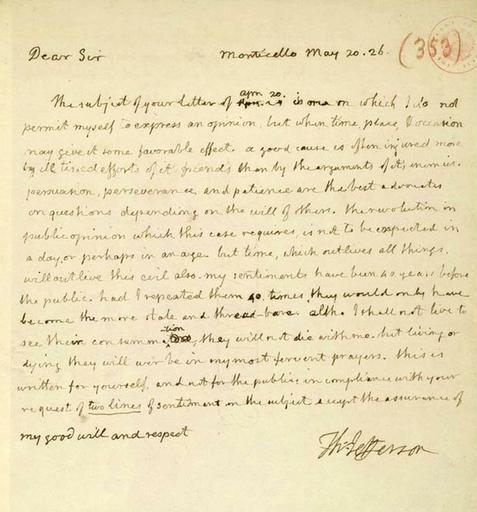MAKE A MEME
View Large Image

| View Original: | Jefferson_Heaton_letter_1826.jpg (746x800) | |||
| Download: | Original | Medium | Small | Thumb |
| Courtesy of: | commons.wikimedia.org | More Like This | ||
| Keywords: Jefferson Heaton letter 1826.jpg <big>Thomas Jefferson</big> to <big>James Heaton</big> May 20 1826 ---- <big>Jefferson's public silence on slavery </big><br> In a letter to James Heaton Whig state representative from Ohio Thomas Jefferson explained his public stance on slavery Near the end of his life Jefferson justified his inaction for trying to end slavery during his presidency with the following explanation in a letter to James Heaton <ref> cite web Library of Congress Thomas Jefferson Legacy July 25 2014 http //www loc gov/exhibits/jefferson/jeffleg html </ref><br><br> <big>DEAR SIR -- Monticello May 20 26<br><br>The subject of your letter of April 20 is one on which I do not<br>permit myself to express an opinion but when time place and occasion<br>may give it some favorable effect A good cause is often injured more<br> by ill-timed efforts of its friends than by the arguments of its enemies <br>Persuasion perseverance and patience are the best advocates<br>on questions depending on the will of others The revolution in<br>public opinion which this cause requires is not to be expected in<br>a day or perhaps in an age; but time which outlives all things <br>will outlive this evil also My sentiments have been forty years before<br>the public Had I repeated them forty times they would only have<br>become the more stale and threadbare Although I shall not live to<br>see them consummated they will not die with me; but living or<br>dying they will ever be in my most fervent prayer This is<br>written for yourself and not for the public in compliance with your<br>request of two lines of sentiment on the subject Accept the assurance of<br>my good will and respect </big><br> -- <big>Thomas Jefferson </big><br><br> <small>Note</small> <references/> ---- May 20 1826 Library of Congress Thomas Jefferson PD-Art PD-old-100 Uploaded with UploadWizard Letters by Thomas Jefferson Letters of the United States | ||||